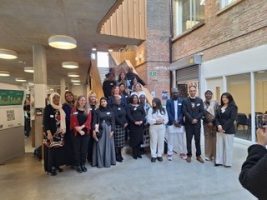The programme supports voluntary sector organisations working with communities adversely affected by health inequalities by training and mentoring their workforce on CPAR methods. This programme builds a skilled workforce to enable people and communities to have an equal voice in how health and care priorities and services are informed and responds to NHS England’s statutory guidance Working in Partnership with People and Communities.
The key findings of the research are presented to system leaders with the aim of informing decisions locally or regionally. Researchers and their host organisations actively shape the design and delivery of this programme.
This is delivered in partnership with the Office for Health Improvement & Disparities (OHID South East), Department of Health & Social Care (DHSC).
Our delivery partners are:
The University of Reading who deliver the 8 stage model of training using A-Z PAR Wheel See the PAR Toolkit
The Scottish Community Development Centre who use their ‘Knowledge is power’ approach to mentor researchers.
The Institute for Voluntary Action Research who trained researchers to identify the right stakeholders, focus on viable recommendations and articulate their ask. See the report Bridging Research and Action

Cohort 3 community researchers at the Showcase, the Foundry, London 25 September 2025
Previous CPAR Programmes and Toolkit
The below links provide further information on the previous CPAR programmes – cohort 1 and cohort 2, along with a CPAR toolkit for those interested in the CPAR approach.
Hearing from one of our partners, the Institute for Voluntary Action Research
A new set of blogs and a report explore how partnerships with community researchers can lead to more effective and inclusive health and care solutions that address complex community needs and challenges, particularly those from the heart of the communities affected.
Between April and October 2024, IVAR worked with 29 community researchers from South East England to identify how their research can inform and influence the priorities, policies and development of health services for marginalised communities in South East England and support them in sharing these recommendations with stakeholders.
The blogs explore the lessons learnt from this work looking at the unique strengths of community researchers and why working in partnership with them leads to impactful, community-driven solutions. They share learning on how stakeholders can engage meaningfully with communities to create lasting impact.
In the report ‘Bridging Research and Action’, you can read about the journeys of some of the community researchers who are committed to improving the lives of their neighbours and building healthier, more inclusive communities.Read the blogs, community researcher journeys and full report here: https://www.ivar.org.uk/blog/what-does-it-take-to-build-effective-solutions-and-services-for-our-communities/
CPAR Toolkit
This toolkit contains a collection of documents to support organisations who wish to deliver a similar CPAR programme. Please note that this toolkit addresses the first cohort whereby NHSE engaged organisations that participate in research with those from minority ethnic communities specifically with the research topic on the effect of COVID-19 on their communities.
CPAR Cohort 3
CPAR Cohort 3 trained 24 Community Researchers from 10 voluntary sector organisations working with communities adversely affected by health inequalities on participatory research methods. The training and mentoring programme ran from October 2024 to September 2025.
The community researchers presented their reports at the Showcase on 25 September 2025, and were celebrated for their achievements. The summaries of cohort 3 researchers’ work can be found here. The full reports are available from the side menu.
CPAR Cohort 2
CPAR Cohort 2 trained 29 Community Researchers who focused on the cost-of living crisis and its effects on the health inequalities of marginalised communities. The summaries of cohort 2 researchers’ work can be found here. See the evaluation of this programme.
CPAR Cohort 1
CPAR Cohort 1 trained 34 Community Researchers who focused on the effects of the pandemic on ethnic minority communities. The summaries of cohort 1 researchers’ work can be found here. See also the evaluation of this programme.